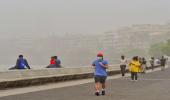Breathing polluted air for long periods of time can cause more serious problems.
Avoid exercising outdoors on bad air days, suggests Dr Varun Gupta.

India has some of the most polluted cities in the world. As many as 8 out of 10 polluted cities in the world are from India.
The major sources of the pollution are caused by emissions from diesel vehicles, and power plants.
Some of the most common harmful gasses present in the air are nitrogen oxide, carbon monoxide, sulphur dioxide and lead.
Pulmonary function tests suggest that nitrogen oxide produced from internal combustion engine vehicles can reduce the functioning of lungs and cause resistance towards respiratory diseases.
Sulphur dioxide (SO2) is majorly produced from power plants and factories. It causes shortness of breath and hence people living nearby factories should avoid working out in the open as it gets easier for it to reach the lower respiratory tract and damage the lungs.
Vehicular pollutants and industrial emission are the major source of lead in the air.
Epidemiological studies depict that lead is the major source of asthma among people living nearby lead polluted areas. Surgical masks and N95 masks are not useful in protection from some of the above mentioned harmful gases.
Apart from the chemicals present in the air, the age of the person, the extent of exposure, the weather conditions also affect the extent of damage to the person's lungs.
As per recent reports, the air quality in India has been worsening due to climatic changes, vehicular pollution and increase in construction work in the cities.
How poor air quality affects the body
Poor air quality triggers oxidative stress starting irritates the eyes, nose, and throat, cause shortness of breath, aggravate asthma and other respiratory conditions.
This naturally affects the heart and cardiovascular system in children to adults.
Breathing polluted air for long periods of time can cause more serious problems.
How poor air quality affects the lungs
Air pollution and ambient exposure to nitrogen oxides, SO2 and PM2.5 (fine particulate matter) from vehicle emissions significantly increase the risk of lung cancer. Smokers are at serious risk.
Prolonged exposure to air pollution exposes children to an increased risk of developing asthma.
Short-term episodes of air pollution in children can heighten respiratory infection symptoms and the frequency of emergency room visits.
Almost nine of ten individuals living in urban areas worldwide are affected by air pollution.
The lack of a fully developed pulmonary metabolic capacity in children make them more susceptible to air pollutants compared to adults.
What happens when you consume poor air?
Irritated airways, feeling out of breath and coughing are some of the common side effects when you consume poor quality air.
Prolonged exposure to air pollution exposes children to an increased risk of developing asthma.
Short-term episodes of air pollution in children can heighten respiratory infection symptoms and the frequency of emergency room visits.
Asthma, chronic obstructive pulmonary disease (COPD), lung cancer and respiratory infections all seem to be exacerbated due to exposure to a variety of environmental air pollutants with the greatest effects due to particulate matter (PM), ozone and nitrogen oxides.
How to stay safe
- Cigarette smoking is the major cause of lung cancer and COPD, which includes chronic bronchitis and emphysema. Secondhand smoke, chemicals in the home and workplace can cause or worsen lung disease. You can start by quitting smoking or staying away from zones where people smoke frequently.
- Avoid exercising outdoors on bad air days.
- A cold or other respiratory infection can sometimes become very serious. If you have a respiratory infection, you need to be extra careful.
- Wash your hands often with soap and water. Alcohol-based cleaners are a good substitute if you cannot wash.
- Avoid crowds during the cold and flu season.
- Good oral hygiene can protect you from the germs in your mouth leading to infections. Brush your teeth at least twice daily and see your dentist at least every six months.
- Get vaccinated every year against influenza. Talk to your healthcare provider to find out how you can improve your immunisation.
- If you get sick, keep it to yourself! Protect the people around you, including your loved ones, by keeping your distance. Stay home from work or school until you feel better.
Dr Varun Gupta (MBBS, MD) is chief medical advisor at Nutrabooti, a D2C brand manufacturing nutraceuticals focused on preventive healthcare for lifestyle-based diseases.
Previously, he led the medical affairs team at the All India Institute of Medical Sciences, New Delhi.
Disclaimer: All content and media herein is written and published online for informational purposes only. It is not a substitute for professional medical advice. It should not be relied on as your only source for advice.
Please always seek the guidance of your doctor or a qualified health professional with any questions you may have regarding your health or a medical condition. Do not ever disregard the advice of a medical professional, or delay in seeking it because of something you have read herein.
If you believe you may have a medical or mental health emergency, please call your doctor, go to the nearest hospital, or call emergency services or emergency helplines immediately. If you choose to rely on any information provided herein, you do so solely at your own risk.
Opinions expressed herein cannot necessarily provide advice to fit the exact specifics of the issues of the person requesting advice.












 © 2025
© 2025